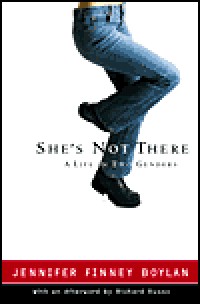
Book Review
She's Not There - A Life in Two Genders
by Jennifer Finney Boylan
With an afterword by Richard Russo
Reviewed by Jamie Faye Fenton

It was a few days before 2001 began. Jenny was having troubles with MEOW, the Transgender Forum chat room. Her browser was crashing and she thought the problem was at her end. She wrote me asking for help, and I responded.
We solved the technical problem quickly and our exchanges continued. We warmed quickly, we shared secrets, and I was able to watch from afar as her transition began. Like many transsexuals at that stage, our new world was both fearsome and fascinating. It was a spirited literary correspondence that gradually chilled as spring came.
Several months ago, I was pleased to learn of the pending publication of a book she was beginning back then. I agreed to write a review of it. It was easy to read and so hard to write about.
James Boylan began independent existence in 1958. During the early 1960's, he realized that he was meant to be a girl instead of a boy. Like many of us, Jim rectified the error via the imagination and occasional trips to the wardrobe. Following the skeletal script from True Selves, Jim tried sex and eventually marriage and fatherhood in futile efforts to put things right. No matter what, the feeling of being in the wrong body was there every day. It was like the 60's classic song She's Not There, by the Zombies.
The transsexual diagnosis came relatively early, as did several friendships with transgender people. Like many of us, James tried to make the guy thing work.
James pursued a successful academic and literary career, publishing several acclaimed comic novels and rising to become the chair of the English Department at Colby College. All along the way, he cross-dressed in private.
The second child arrived with serious medical complications and Jim & Grace move into the Ronald McDonald house. While this trial had a fortunate ending, it also seems to be the demarcation. James becomes Jennifer and undertakes the requisite hormone treatments, hair removal, voice lessons, and therapy sessions that trannies prattle about constantly. Later, Jennifer visits Dr. Schrang (whom she describes with precision-guided wit). Grace struggles with the wife's pain and both work to hold the family together.
This story, so familiar to all of us, is made vivid and humorous by Jenny's formidable skills as a writer. Jenny tends to write in what I call spins: a series of vignettes, often metaphorical and ironic, that both describe an incident and pull deeper meanings from it. An example would be her description of a lonely trip to a Canadian island where she was leaning into the wind on the edge of a cliff, thinking about going over, and having a strong gust blow her backwards. There are also walks in pitch-blackness, hurricanes, a monkey orphanage, Irish pubs, scary bikers, and nights playing Rock & Roll in the roadhouses of New England.
In a particularly amusing chapter, Jenny writes NASA to apply to be the first transsexual astronaut, so she can "educate the country about gender issues from the environment of zero-gravity"; She includes the priceless response from Winfield Hooker, NASA Associate Administrator for Space Flight.
This autobiography, like her fiction, is replete with this anti-gravity. Her recent novel, Getting In, is particularly recommended for both its quality and the many points of comparison to She's Not There.
Unlike Deirdre McCloskey's Crossing, where the marriage ends painfully, She's Not There gives a sympathetic portrayal of Grace's experience, and this book will undoubtedly help many relatives of transsexuals cope.
The other major character is her friend, noted novelist, and teaching colleague Richard Russo, who progresses from deep skepticism to enthusiastic support at her bedside in Neenah.
So we have True Selves as an evergreen tree, decorated with exquisite ornaments from Jenny's life. It is fun, and like all good humor, has sad and thought provoking moments.
I am disappointed about one thing: We are not in the book. Jenny wrote many articles for TGForum under a pseudonym, as well as keeping a detailed web journal. While I understand her modesty, she gave very much of her self to us. It's a part of her life the world should know about.
One of my letters to her summed up our divergence: "So you will tend the home place and I will be the Disco Dolly". I plunged into San Francisco nightlife. Now she's on Oprah and I am drifting. I occasionally read through the letters we exchanged and think about our trajectories and outcomes.
Her show, like mine, is far from over. I hope she writes more about what happens to her now that she has left the harbor for the sea. I long to see more facets of the jewel.